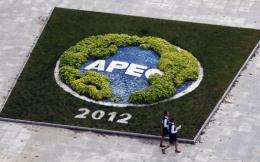'Green' products trade gains momentum in APEC

A push to boost Asia Pacific trade in environmentally friendly goods gained momentum Thursday as officials agreed to cut tariffs on bamboo floor panels, solar batteries and dozens of other "green" products.
Russian Minister of Economic Development Andrey Belousov said regional trade ministers agreed following two days of "intense" talks on a list of 54 products eligible for tariff cuts, in a bid to create more sustainable economic growth.
He described the agreement as a breakthrough, after discussions the previous day in the eastern Russian city of Vladivostok hit a rough patch amid bickering over which products should qualify.
"We're seeing a new market emerging for environmental goods," Belousov said.
Leaders of the 21-member Asia Pacific Economic Cooperation (APEC) who met in Honolulu last year had directed officials to come up with a list of green products by the end of this year.
However, there had been disagreements on what should be in the basket, with the United States wanting a "credible" list of products, China pushing to include bicycles and others saying honey was also an environmental product.
In the end, neither bicycles nor honey were on the list.
But the final list did include gas turbines, solar water heaters and bamboo floor panels, as well as equipment that recycles waste and controls air pollution.
The ministers will endorse the list to APEC leaders during their summit in Vladivostok this weekend.
If the leaders agree, tariffs on the products will be slashed to five percent or less by 2015.
Some APEC members have tariffs on these goods of 30 percent or more, according to Belousov.
However, an end-of-meeting statement by the ministers said the tariff cuts would take into account the "economic circumstances" of the each APEC member, a caveat that allow economies to defer action until they are ready.
Commitments are also voluntary in APEC.
On Wednesday, Belousov said the trade officials were able to agree only on 20 product groups but developed countries wanted the list expanded, leading into another day of discussions.
A joint press conference by Belousov and Russian Foreign Minister Sergei Lavrov was delayed for two hours Thursday as ministers held last-minute talks to hammer out a consensus.
"I can tell you it was very intense," Belousov said, but emphasised it took APEC only one year to reach an agreement, while the World Trade Oranization had not been able to do so during a decade of efforts.
Analysts said it was difficult to make an accurate estimate of the market potential for environmental products.
But the APEC Policy Support Unit, the grouping's research arm, studied trade patterns for a list of 164 potentially environmental goods that the EU and several developed countries, including the US, suggested to the WTO in 2007.
Global trade in the listed goods rose at an average annual rate of 12.8 percent between 2002 and 2010, when it reached $871.5 billion, with APEC members responsible for $443.5 billion of international sales, the unit said.
Products used in renewable energy plants, waste water management and potable water treatment as well as management of solid and hazardous waste registered the biggest trade volumes in 2010, the unit said.
The policy unit said the initial findings show the market is "potentially huge" and called also for the removal of cumbersome certification procedures and other non-tariff barriers.
(c) 2012 AFP



















